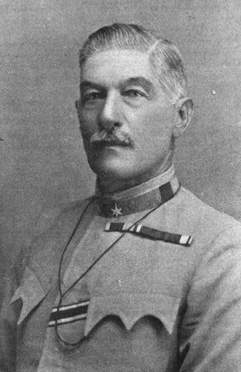 Adof
Rudolf Theodor Ritter von Brudermann was the youngest of the three sons of the k.k.
Generalmajor Rudolf Ritter von Brudermann. Born on the 2nd of June 1854 in
Vienna he commenced his education at the Cadett-Institut at Marburg and in 1869 entered like his
two older brothers (Anton and Rudolf) before him the Theresian Militär Akademie at Wiener Neustadt.
He graduated from the academy in 1874 and was commissioned as a Leutnant in ulan regiment number 1. After his
promotions to Oberleutnant (1st May 1879) and Rittmeister 2.Klasse (1st November 1889) and receiving the
knights' cross 1st class of the Saxon Albrechts order he became an instructor at the Militär-Reitlehrer-Institut (training school for riding
instructors) on the 1st of May 1890 and remained there, with some interruption for
troop duty in ulan regiment number 1 between 1894 and April 1899 until the 20th
of July 1904. In the meantime he had on the 6th of March 1886 married Amalie
Franziska Juliane (born Strzygowski) at Biala with whom he had three daughters. For his proven skills as an instructor he was awarded the Military
Merit cross (1894) and the bronze Military Merit medal (Signum Laudis) in September 1904. Adolf Ritter von Brudermann was even a well
known riding teacher at the time and his horsemanship was often recognized by foreign
awards - Prussian Crown-Order 3rd class (April 1893), Siamese Order of the Elephant
4th class (January 1898), Prussian Red Eagle Order 3rd class (October 1898),
Officers' cross of the Dutch Order of Oranien and Nassau (December 1903) and the
Commander's badge of the Order of the Crown of Italy (January 1904)!
Adof
Rudolf Theodor Ritter von Brudermann was the youngest of the three sons of the k.k.
Generalmajor Rudolf Ritter von Brudermann. Born on the 2nd of June 1854 in
Vienna he commenced his education at the Cadett-Institut at Marburg and in 1869 entered like his
two older brothers (Anton and Rudolf) before him the Theresian Militär Akademie at Wiener Neustadt.
He graduated from the academy in 1874 and was commissioned as a Leutnant in ulan regiment number 1. After his
promotions to Oberleutnant (1st May 1879) and Rittmeister 2.Klasse (1st November 1889) and receiving the
knights' cross 1st class of the Saxon Albrechts order he became an instructor at the Militär-Reitlehrer-Institut (training school for riding
instructors) on the 1st of May 1890 and remained there, with some interruption for
troop duty in ulan regiment number 1 between 1894 and April 1899 until the 20th
of July 1904. In the meantime he had on the 6th of March 1886 married Amalie
Franziska Juliane (born Strzygowski) at Biala with whom he had three daughters. For his proven skills as an instructor he was awarded the Military
Merit cross (1894) and the bronze Military Merit medal (Signum Laudis) in September 1904. Adolf Ritter von Brudermann was even a well
known riding teacher at the time and his horsemanship was often recognized by foreign
awards - Prussian Crown-Order 3rd class (April 1893), Siamese Order of the Elephant
4th class (January 1898), Prussian Red Eagle Order 3rd class (October 1898),
Officers' cross of the Dutch Order of Oranien and Nassau (December 1903) and the
Commander's badge of the Order of the Crown of Italy (January 1904)!
Following his promotion to Major (1st May 1897) and Oberstleutnant (1st November 1900) he was at the point where he had to finish his career as a riding instructor and become a regimental commander. This came finally at the end of July 1904 when he assumed command of ulan regiment number 2. Shortly after this on the 5th November 1904 he received his promotion to the rank of Oberst. His satisfactory leadership of the regiment was recognized by the award of the Orden der Eisernen Krone 3.Klasse (Order of the Iron Crown 3rd class) in August 1908. In April 1910 he took over the command of the 3rd cavalry brigade at Marburg and was appointed Generalmajor on the 28th of October of the same year. He became commander of the 3rd cavalry division at Vienna in June 1913 and was promoted to Feldmarschall-Leutnant on the 3rd of November 1913. To achieve such a command and this rank on active duty was very uncommon for an officer who had not graduated from the Kriegsschule. Under normal conditions he would have now reached the top of his career and after 40 years honorable duty could look forward to his retirement - but the outbreak of the war in 1914 changed everything.
Adolf Ritter von Brudermann remained as commander of the 3rd cavalry division until December 1916. Between June and August and again between October and December 1916 he was additionally the commander of the ad-hoc "Kavalleriekorps Brudermann". His leadership was recognized by the award of the Orden der Eisernen Krone 2.Klasse (Order of the Iron Crown 2nd class) on the 30th of October 1914 and the Militärverdienstkreuz 2.Klasse (Military Merit cross 2nd class) on the 22nd of September 1915 - both neck badges with the war decoration of course. From the German Allies he received the Prussian Crown order 1st class (27th July 1914) and the Iron Cross 2nd class (March 1915) in the same period. His deteriorating health compelled him at the end of 1916 to leave his post and to ask for retirement. This was granted in March 1917 and rewarded with the commanders' cross of the Leopold order with war decoration. He retired with the honorary rank of General der Kavallerie mit Titel und Charakter to Vienna.
He lived, withdrawn from public life and known as "the other" Brudermann, there in the 3rd district near his brother Rudolf's home until his death shortly after World War 2 and was buried at Vienna's Zentralfriedhof on the 26th of October 1945.